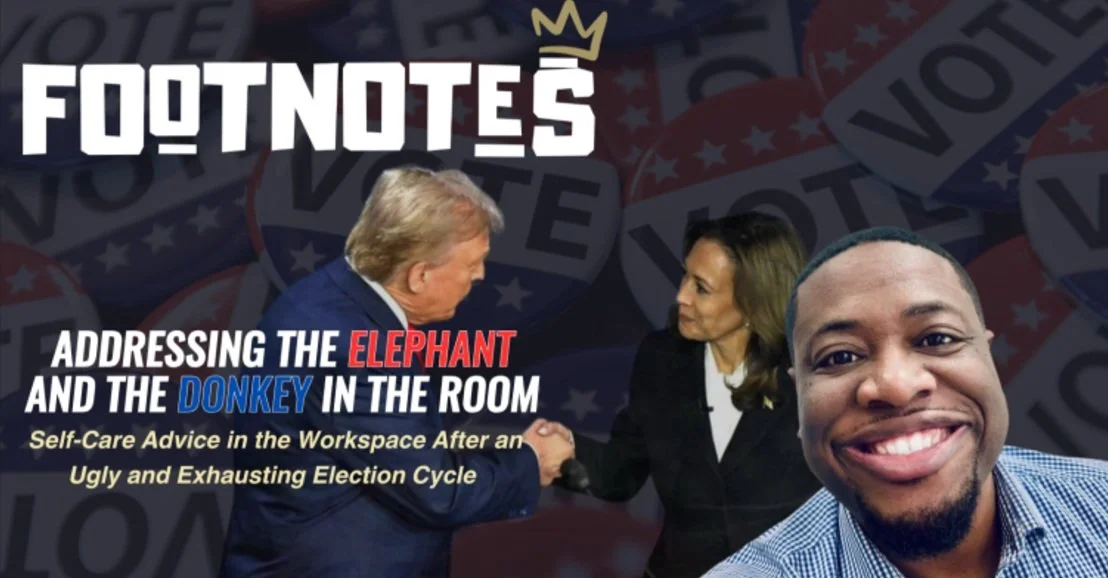Addressing the Elephant and the Donkey in the Room: Self-Care Advice in the Workspace After an Ugly and Exhausting Election Cycle
These last few months leading up to the election have condensed years of simmering politicized tensions among our communities into one pivotal voting moment. And, when it's all said and done, we have to return to work. In light of this reality, I figure that now would be the time to offer up some communal self-care advice for navigating this post-election cycle environment in the workplace that Tim Walz would best characterize as "weird."
It’s the morning after election night, which is a relief in some ways—no more television (and streaming) political ads, texts, and phone calls. However, it also brings tension as the remaining votes are being counted to determine the winners. While we wait, we can’t help but reflect on the ugliness of this chapter in our political history: widespread misinformation and disinformation, ballot boxes set on fire, claims of election fraud, conspiracy theories, extremely partisan interpretations of events, a rush of legal challenges, outright voter intimidation, openly antagonistic misogyny, comments laced with -isms, threats of another civil war, and even an attempted assassination. Wait… I can’t believe I just typed that, yet here we are.
While many of these incidents have successfully threatened to undermine trust in our institutions and further widen divisions between communities, one thing remains certain: regardless of the electoral outcomes, we will eventually return to work and have to engage with colleagues who may feel relieved, disheartened, or simply trying to cope over the fate of their preferred candidates.
So, how do we pick up the pieces and move forward? I don’t have all the answers, but I do have a few practical suggestions and reminders to serve both employers and employees.
Prioritize Self-Care
Create Mental Boundaries: Set personal boundaries around political discussions. If it helps, limit the amount of news you consume or avoid workplace discussions on social media.
Practice Mindful Breathing and Reflection: Techniques like deep breathing, journaling, coloring, cognitive reframing, “taking a lap,” and mindfulness can be powerful in reducing stress. Using any of these options before, during, or after work can help clear emotional residue and keep you focused.
Lean on Your Support Network: Whether it’s a friend outside of work or a therapist, sharing in a safe space can relieve stress. Don’t bottle up your emotions; it’s okay to reach out for support.
Engage in Positive Social Activities: Invite colleagues for a team-building activity unrelated to politics. A trivia night, karaoke, or a coffee break chat can help restore common ground in a neutral setting.
Foster Open, Respectful Communication
Set Clear Norms for Political Conversations: Encourage boundaries by suggesting that political discussions take place outside of team meetings. Set team norms to ensure conversations remain respectful or even agree that certain topics are best avoided at work.
Seek Common Values: Focus on what unites your team rather than what divides you. Emphasize shared goals—such as your organization’s mission, values, or project outcomes—to help people reconnect around common objectives.
Use Neutral Language and Assume Positive Intentions: When discussing sensitive topics, choose words that don’t carry political weight. Focus on “we” and “us” rather than “they” or “them” to avoid creating an us-versus-them dynamic.
Engage in Constructive Actions to Build Community
Organize Team Volunteer Days or Service Events: Giving back can foster camaraderie and shift focus to community and shared impactful goals. Consider local volunteering options, such as food banks or community clean-ups, that foster connection beyond workplace roles.
Encourage Professional Development on DEI and Conflict Resolution: Learning about diversity, equity, inclusion, and strategies for conflict resolution can be transformative for building a culture of respect and empathy. Invest in learning or engagement experiences that give employees tools to thoughtfully approach topics with each other.
Implement a Feedback Loop: If there’s tension or underlying conflict, create an anonymous feedback channel where employees can express concerns. Showing that leadership listens and is responsive to feedback helps build trust and transparency.
Be Kind, Patient, and Lead by Example
Practice Active Listening: Listen more than you speak, especially when tensions are high. Acknowledging someone’s perspective doesn’t mean you agree; it means you respect their right to have their views.
Model Empathy and Encouragement: Even small gestures—a warm “good morning,” a compliment, or offering help—can rebuild camaraderie. These interactions strengthen bonds and remind everyone of their value.
Acknowledge and Celebrate Small Wins Together: Don’t underestimate the impact of celebrating as a team. Recognizing a small project win, an employee's accomplishment, or a team milestone can help rebuild connections and emphasize positivity.
There is a lot of negative rhetoric and political rubble for us to clean up, and there’s no quick fix. Rebuilding bonds, trust, respect, and security takes time. But by committing to civility and honoring human dignity, we can at least extend the grace needed to begin. The reality is that regardless of who sits in the White House, State House, or any office of leadership, we have to find common ground and move forward as a community. #TheMarathonContinues
Well... That's all I got. Thanks for reading. I’d love to hear your thoughts. Did I miss anything? Do you have personal experiences or observations to add? Let me know! ✌🏾+🫶🏾
Footnotes is a newsletter dedicated to exploring trends in diversity, equity, inclusion, and belonging, while also serving as a platform for me to re-engage with writing and stimulating meaningful conversations in this field. Your participation is greatly appreciated. Please note that the views and opinions expressed in these communications are solely my own and do not necessarily reflect those of any affiliated entities. Thank you for joining the discussion.


